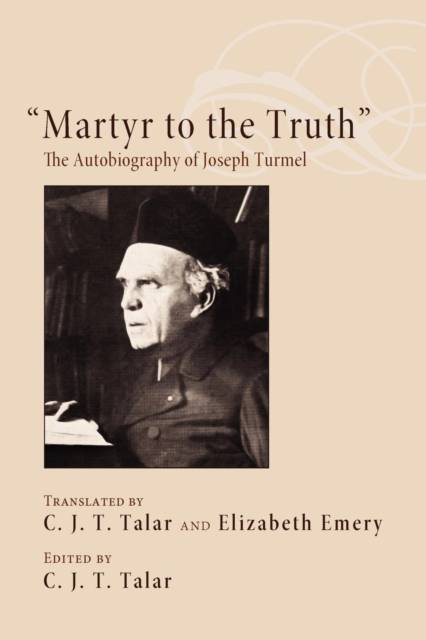
Bedankt voor het vertrouwen het afgelopen jaar! Om jou te bedanken bieden we GRATIS verzending (in België) aan op alles gedurende de hele maand januari.
- Afhalen na 1 uur in een winkel met voorraad
- In januari gratis thuislevering in België
- Ruim aanbod met 7 miljoen producten
Bedankt voor het vertrouwen het afgelopen jaar! Om jou te bedanken bieden we GRATIS verzending (in België) aan op alles gedurende de hele maand januari.
- Afhalen na 1 uur in een winkel met voorraad
- In januari gratis thuislevering in België
- Ruim aanbod met 7 miljoen producten
Zoeken
"Martyr to the Truth"
The Autobiography of Joseph Turmel
Paperback | Engels
€ 47,45
+ 94 punten
Omschrijving
In his autobiography Joseph Turmel (1859-1943) has left an intensely personal account of his struggles to reconcile his Catholic faith with the results of historical-critical methods as those impacted biblical exegesis and the history of dogma. Having lost his faith in 1886, he chose to remain as a priest in the Church, even while he worked to undermine its teachings. He did so initially in writings published under his own name and, as his conclusions became increasingly radical, under a veritable team of pseudonyms. He was excommunicated in 1930. His account of his life is less a discussion and defense of his ideas than it is a moral justification of his conduct. Turmel is associated with the left wing of Roman Catholic Modernism along with Albert Houtin, Marcel Hebert, and Felix Sartiaux
Specificaties
Betrokkenen
- Vertaler(s):
- Uitgeverij:
Inhoud
- Aantal bladzijden:
- 260
- Taal:
- Engels
Eigenschappen
- Productcode (EAN):
- 9781610978378
- Verschijningsdatum:
- 18/10/2012
- Uitvoering:
- Paperback
- Formaat:
- Trade paperback (VS)
- Afmetingen:
- 155 mm x 229 mm
- Gewicht:
- 408 g

Alleen bij Standaard Boekhandel
+ 94 punten op je klantenkaart van Standaard Boekhandel
Beoordelingen
We publiceren alleen reviews die voldoen aan de voorwaarden voor reviews. Bekijk onze voorwaarden voor reviews.








